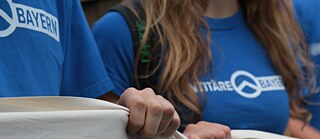WOMEN IN CONTEMPORARY RIGHT-WING EXTREMISM
WOMEN IN CONTEMPORARY RIGHT-WING EXTREMISM - Of concerned mothers and cool poster girls

It has become apparent since as recently as the trial of the right-wing extremist terrorist Beate Zschäpe, that right-wing women do not shy away even from terrorism. Women are involved in all areas of the New and Old Right.
By Esther Lehnert
By Esther Lehnert
Women’s role has been pluralised as in other areas of society. Many forms of femininity have their place here too, whether as a stylish "poster girl" of the Identitäre Bewegung (IB) [Identitarian Movement] who likes to figure prominently at the forefront during right-wing extremist marches, as a right-wing extremist or right-wing populist politician of the NPD or AfD, an ethnic settler, a businesswoman, an Internet activist or a follower. They like to present themselves as modern and militant. This is how Lisa, a former IB activist, has her say in an interview in the right-wing populist newspaper Compact:
"We are in essence the true activists of women's rights because we work in the here and now to improve women's living conditions and are not interested in hating men, controlling language and redefining problems. (...) We Identitarian women in particular are a danger to the dominant ideology."[1]
Yet notwithstanding this modernisation, which is also visually perceptible, traditional motherhood still plays a crucial role. The significance of traditional women's roles for the New Right becomes clear when looking at female politicians of the AfD as Germany's most important right-wing populist party and the IB. The latter present themselves as hip and modern in social media such as Instagram, in blogs or on YouTube, where they are keen to come across as cool, sexy and sporty, while at the same time fully supporting the IB's reactionary image of family and women. For example, the following statement by a female activist can also be found in the magazine Compact:
"I am certainly not a homebody type. But I think it's good if women also mainly look after their children. Who wants children simply to put them in a crèche or nursery?"[2]
The striking thing about the high-profile, political engagement of many AfD female politicians is that they manage to discuss issues specific to women and give them a racist twist. It is not surprising that they like to present themselves as "concerned" mothers or grandmothers. In this way, they can use seemingly apolitical concerns about their children or grandchildren, for example, and everyday experiences to shift the political discourse further to the right and thus normalise right-wing ideas. When a mentally ill man from Switzerland of Eritrean origin pushed a child in front of an arriving train, thus killing him, in July 2019, the then AfD member of parliament and now non-party member Verena Hartman had this to say on this tragic incident on Twitter: "Mrs Merkel, what else do you want to do to us? You will never know what it means to be a mother, neither for a child, nor for this country! But I curse the day you were born!"[3]
"Concerned Mothers and Grandmothers," "Mothers against Violence" are names of racist initiatives that were founded especially after the events of the New Year's Eve in Cologne 2015/16 and are active throughout the Federal Republic. A large number of public sexualised assaults on girls and women in Cologne occurred on that night. As a result, "Mothers against Violence" had no frets or worries about mobilising and taking to the streets together with known neo-Nazis, right-wing hooligans and right-wing violent criminals as well as AfD and NPD politicians.
"Women's issues" such as raising children play a major role also for female intellectuals of the "New Right" such as Ellen Kositza or Caroline Sommerfeld. It is important for them to come across as declared anti-feminists. They publish essays on the matter in the neo-rightist magazine Sezession and issue their own publications.[4] Neither has “a need for feminism" and both present themselves as victims of "opinion dictatorship" and as astute, provocative analysts of the political present, as tends to be the case in their circles. The "concern" for the safety of "our" women and children proves to be a central bridging narrative to all parts of society.
It is especially such "female" productions that ensure that women continue to be overlooked and underestimated, regardless of their presence and relevance in all parts of the right-wing scene. The cliché of the "apolitical girl" and the "peaceful woman" still applies. Right-wing extremism in particular is still wrongly considered a "man's problem". The principle of "double invisibility"[5] is at work here: girls and women are still less likely to be politically active, and if they are, then certainly not in right-wing structures.
[1] Dassen 2017: 14, 16, Marc Dassen, 2017: Jung, wild, patriotisch. Marc Dassen im Gespräch mit Mädels der Identitären Bewegung (ID). In: Compact No. 2/2017. pp. 14-16.
[2] Ibid., p. 16.
[3] Tweet from 29 July 2019, Verena Hartmann twitter 2019
[4] e.g. Ellen Kositza (2016): Die Einzelfalls - Warum der Feminismus ständig die Straßenseite wechselt, Schnellroda, Caroline Sommerfeld (2019): Wir erziehen- 10 Grundsätze, Schnellroda.
[5] Esther Lehnert/ Heike Radvan (2016): Rechtsextreme Frauen. Analysen und Handlungsempfehlungen für Pädagogik und Soziale Arbeit, Berlin, Opladen, Toronto.